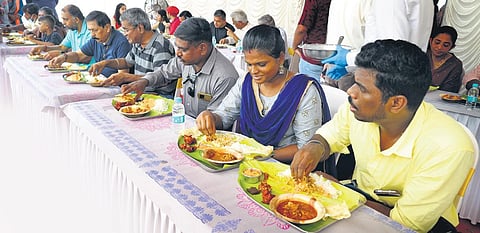

CHENNAI: The smell of coconut and simmering kuzhambu wafts onto Cathedral Road from a makeshift tent area inside Semmozhi Poonga. A closer glimpse and inevitable taste reveal a menu of 50-odd dishes from Sri Lanka, Myanmar, and Afghanistan, packed with memories of war-torn homelands, hurried escape for asylum, and tales of culture on the tongue.
From Sri Lanka’s steaming puttu with chicken kuzhambu, biscuit-like kalakala and fish cutlets, to Myanmar’s jaggery-based dessert dhooi pila and channa soup, the festival, ‘Oorum Unavum’ — conducted to mark World Refugee Day — beckoned crowds. The stalls, which drew over 7,000 people in two days, also included Afghan food like lightly-spiced Kabuli pulao, a dumpling dish with meat stuffing called manthu and a sweet pudding, firni.
The fete was organised by United Nations High Commissioner for Refugees (UNHCR), Organisation for Eelam Refugees’ Rehabilitation (OfERR), Advantage Foods Private Limited, the state government and stakeholders. Themed ‘Hope Away From Home: A World Where Refugees Are Always Included’, the event — which raised Rs 4.5 lakh — aimed to understand these communities’ experiences, foster solidarity, and celebrate self-reliance.
“Eating is something humans need to do. This programme is a combined effort to put together refugees who have in their way brought in a skill when they came to India, through the food habits of the people of Sri Lanka…They can cater to the likes of the locals and learn skills like nutritious food production,” explains SC Chandrahasan, founder of the OfERR. He emphasises education as a tool to empower these communities and go beyond just job placements.
Spoonful of Memories
At the helm at the Sri Lankan food stall, Vasanthi Kumari interacts with customers, shares recipes passed on through the generations, and explains the intricacies of cultures. As she juggles these duties, steaming food arrives from the kitchen behind the tent, cooked by the female employees of Olaiputtu, a Thoothukdi-based restaurant. Named after a Sri Lankan dish wrapped in the olai leaf, the hotel was set up last year by DMK MP Kanimozhi to help Sri Lankan refugees stand on their own feet. In the same spirit, she inaugurated ‘Oorum Unavum’ on Saturday.
Often, food harbours recollection of culture and homelands. As Vasanthi explains to CE, “When people asked about the preparation after enjoying the food, it was overwhelming. We never eat idli or dosa there. It is always idiyappam or puttu… Unique drool-worthy food and fruits are there (in Sri Lanka).” Born into a farming family in Colombo, Vasanthi recalls a childhood spent drinking water directly from ponds and springs.
In 1990, during the decades-long civil war between the Sinhalese-dominated government and the Liberation Tigers of Tamil Eelam (LTTE), she was among the thousands of Eelam Tamils that fled their country. “During the war, we have gone hungry. It is recorded like a movie in my head. We struggled and crossed the sea by boat and reached Rameshwaram. We left Sri Lanka to save our lives and we did not bring anything with us except our education and there are no major jobs for us... Now there are few opportunities slowly opening up for us.” Currently reeling from the 2020 economic crisis and political instability, the island country faces a shortage of diesel, petrol and necessities.
Much like Vasanthi, 19-year-old Mohammed Junaid, too recalls fleeing from Myanmar with his mother, via Bangladesh and Kolkata to Chennai. Rohingya Muslims of Myanmar are denied citizenship and have been targets of persecution and genocide. Now a daily-wage worker, he lives among 100-odd other Rohingya Muslims at a camp in Kelambakkam.
Behind the scenes, the teen deftly chopped away onions and tomatoes for the fast-selling le paasu, the Burmese salad dish includes pulses and a dash of oil. He adds that Burmese food is vera level, vera madhiri and Chennai’s Burma Bazaar has 5% authentic food.
Demands for citizenship
In his poem ‘Refugee Blues’, WH Auden writes, “Once we had a country and we thought it fair, Look in the atlas and you’ll find it there: We cannot go there now, my dear, we cannot go there now.” In times when crises and wars continue, refugee communities can scarcely dream of returning to their homelands.
Settled in India for decades, many like Vasanthi, urge the state government for Indian citizenship, better housing, and education. “We don’t belong to any country and live as refugees till present. The children’s education and employment have been affected as they don’t belong to any place. If we get citizenship, things would be better,” she adds.
According to Mohammed, companies require identity proof like Aadhaar or Pan cards. “What good will it do to miss my country? If I go there, they will shoot and kill me. Even if India gives me citizenship, I might not take it because my own house and own shop still are in my land.” he says, adding he likes living in Chennai and if things get better, he could return to his country.
“We must support these communities. People have not slept for more than 48 hours to make this happen. We want to emphasise that every country has been given options to show the strengths and what they are,” explains Syed Atlaf, food and beverage manager, from Advantage Foods Private Limited. Beyond borders, everybody is human and it should be like everyone is part of a family, he signs off.